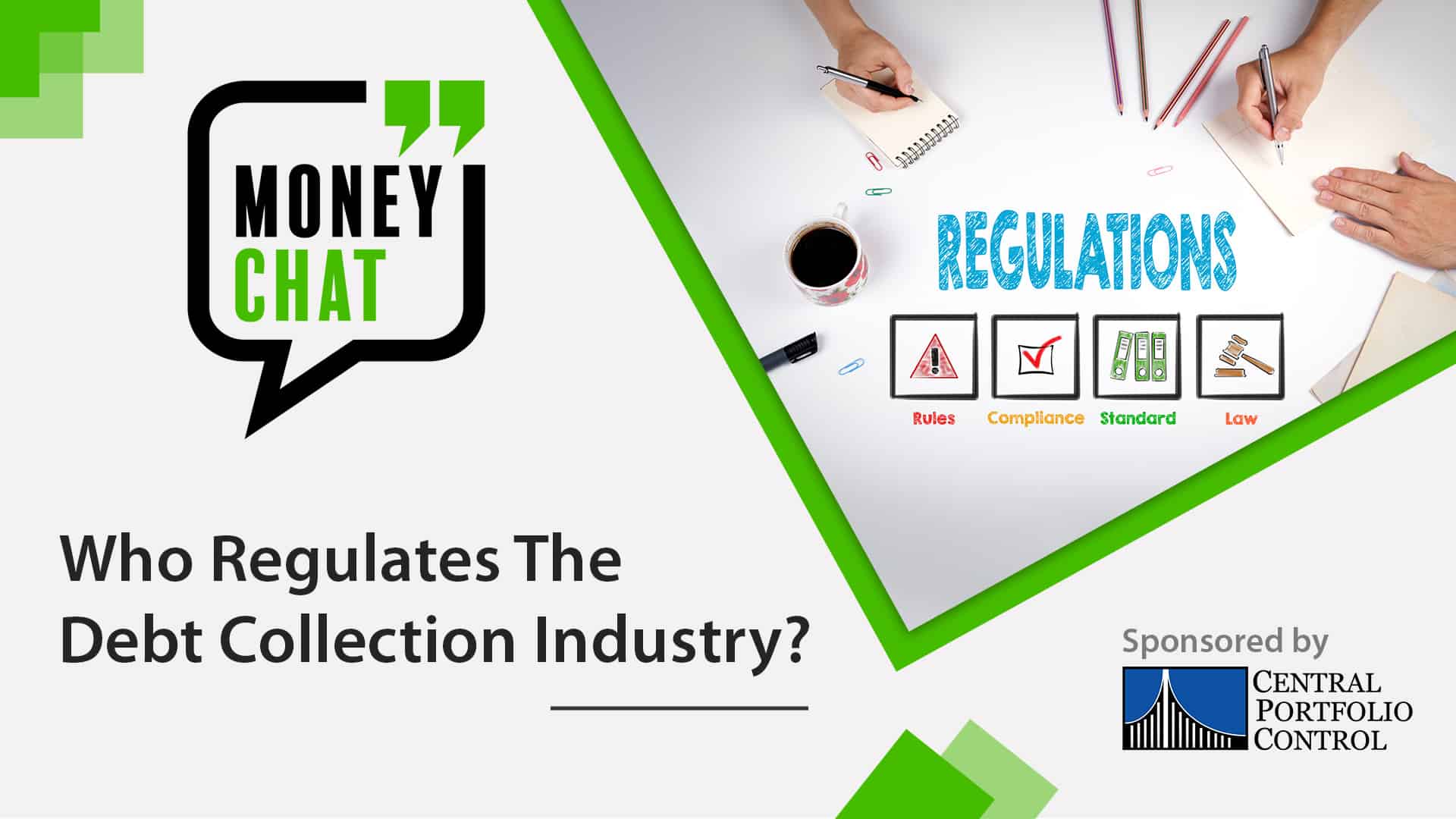
Who Regulates the Debt Collection Industry?
Have you ever wondered who’s in charge of making and enforcing rules about debt collection? Legislators who develop laws as well as judges who make rulings to apply those laws are a major part of governing the industry, but there are also government agencies who develop, monitor and enforce regulations. There is also a great deal of internal “self-regulation” through industry marketplace competition and standards of best practice. There are lots of acronyms and even more “legalese” when it comes to consumer rights and legal compliance in the debt collection space, but this article will help get to the major points.
The goal of this Money Chat is to cover the basics of who helps to create, monitor, and enforce rules and regulations in the debt collection industry.
The Legislative Process
Congress members and other elected officials all help to develop state and federal legislation about everything relevant to citizens’ rights, including financial services and consumer protection. For example, when the housing market crashed in 2008 and the economy entered a subsequent recession, one of the pieces of legislation made in response to the crisis was a bill called the Dodd-Frank Wall Street Reform and Consumer Protection Act.
Known for short as the Dodd-Frank Act, the bill created a new government agency that would help to prevent future financial collapses and protect consumers through the oversight of financial institutions. (The agency, called the Consumer Financial Protection Bureau (CFPB), was started in 2011 and is “a U.S. government agency dedicated to making sure you are treated fairly by banks, lenders and other financial institutions.”)
The Legal System
Attorneys and judges are another important part of the regulation of the industry. They rely on navigating and applying existing laws and constitutional rights to determine whether specific cases have violated any regulations or the rights of either party in specific formal legal complaints. The determinations made in courts and state Attorney Generals, by trying and resolving cases about consumers and debt collection, add additional “meat to the bones” of legislation as it is applied and hammered out over time to various individual or class action legal complaints and court cases.
A review of court rulings will reveal that there are plenty of cases “won” by consumers, but also a healthy balance of cases “won” by creditors; creditors and collectors are not always “the bad guys.” Despite negative perceptions or stereotypes, present-day collectors are typically just doing their jobs in accordance with the law while providing a necessary business function for the lending and credit ecosystem.
Regulatory Agencies for Debt Collectors
Federal regulatory agencies including the CFPB (mentioned above), the Federal Trade Commission (FTC), the Federal Communications Commission (FCC), and the Office of the Comptroller of the Currency (OCC) are also involved in monitoring the debt collection industry. Most debt collection regulations can be found in a large piece of legislation called the Fair Debt Collection Practices Act or FDCPA. Compliance with the Act is monitored and enforced by the FTC and the CFPB.
The CFPB is more heavily involved in rulemaking, and was responsible for the development of a 2021 update to the FDCPA, known as Regulation F. Another key set of rules about debt collection comes from the Telephone Consumer Protection Act (TCPA), which is monitored by the FCC. As technology and digital communications increase, data privacy laws increasingly apply to the industry as well. In some states, state regulatory agencies are also involved in state-specific rulemaking and enforcement, such as in New York and California. Hefty monetary fines, among other consequences, can be enforced for noncompliance with established regulations.
Self-Regulation Measures in Debt Collection
With many compliance factors to consider and business reputations to protect, businesses in the debt collection industry (also referred to as the receivables management industry) are cognizant of the criticality of adherence to regulations. Employees and business owners in the industry are consumers too and are generally motivated to protect both the credit ecosystem and the rights of other consumers. To ensure compliance, reputable businesses in the industry have comprehensive compliance management systems in place and take part in ongoing compliance training and professional development through major industry trade associations such as Receivables Management Association International (RMAI), ACA International, National Creditors Bar Association (NCBA), and others.
Through internal and third-party auditing as well as professional certifications such as the RMAI Certification Program, ACA International Certification Program, various data security certification options, and the promotion of financial literacy resources, many businesses in the industry choose to operate above and beyond regulatory standards and strive to create a positive, fair and reasonable environment for consumers to resolve their accounts and improve their financial stability. Creditors know that it’s good business to optimize compliance and protect brands, so best practices and trustworthy partnerships are important not just for consumer protection but for growth. Consumers can reach out to the compliance staff of their collector or creditor about compliance-related concerns or their experience with collectors as the first step. This should be the fastest and most direct opportunity to resolve any questions or issues.
Additional Resources
To learn more about regulation in the debt collection industry, here are a few additional resources:
- ConsumerFinance.gov by the CFPB
- Resources by ReceivablesInfo.com
- Understanding Debt Collection Regulations by Thomson Reuters
- Understanding my Rights by ACA International
For additional information about other financial literacy topics related to consumer credit and debt, please visit the rest of the Receivables Info Money Chat series.
Have an idea for a Money Chat topic?
We want to hear from you! If you have a suggestion for a future Money Chat topic, please email us at [email protected].
The information contained in this article is meant to serve as general guidance for consumers and not meant to serve as comprehensive financial advice. For questions about your individual circumstance, finances, or accounts, please contact your creditor(s) and/or financial advisor directly.
Thank you to our Sponsor
Headquartered in Minnetonka, MN, Central Portfolio Control, Inc. (CPC) is a full-service and nationally licensed collection agency focused on the recovery of distressed accounts receivable. Since being founded in 1998, the Central Portfolio Control team has continued to grow, providing top-quality services to our clients and jobs to our local community.









